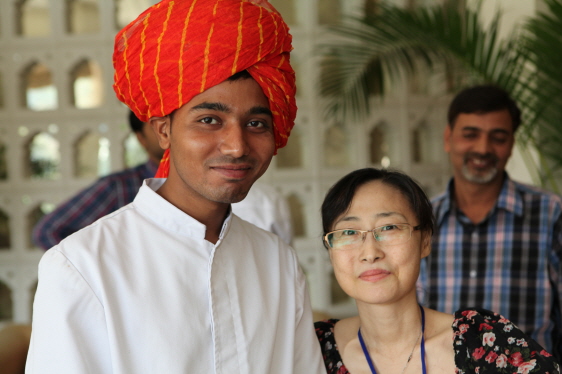세계석면소비 절반으로 줄이자

11월14일과 15일 양일간 인도 자이푸르(Jaipur)에서 아시아석면추방네트워크(Asian Ban Asbestos Network) 3차 연례회의가 열렸습니다. A-BAN은 2009년 4월 홍콩에서 아시아지역의 노동단체와 환경단체 그리고 석면전문가 및 석면피해자들이 모여 결성했습니다. 한국에서는 2008년 결성된 반코(한국석면추방네트워크 Ban Asbestos Network Korea)의 백도명(상임대표), 최예용(집행위원장), 이정림(악성중피종암환자), 이성진(환경보건시민센터 운영위원, 그린다지이너) 등 4명이 참석했습니다.
아시아지역 10여국가(인도, 인도네시아, 필리핀, 말레이시아, 중국, 홍콩, 일본, 한국 등)와 미국, 영국, 벨기에 등에서 모두 50여명이 참석했습니다. 참석자들은 전세계 석면소비의 70%가 아시아에서 이루어지고 있고 석면피해가 속출하고 있다고 지적하며 아시아에서의 석면추방을 신속하게 추진해야 한다고 입을 모았습니다. 국제석면추방사무국(IBAS)의 로리 알렌카잔은 2013년 7월에 영국의 글래스고에서 세계석면회의(Global Asbestos Congress)를 개최한다고 발표했습니다. GAC(세계석면회의)는 2000년 브라질 1회, 2004년 일본 동경 2회에 이어 3회째입니다. BANKO의 최예용 집행위원장은 "2013년 세계대회때까지 전세계 석면소비량 2백만톤을 1백만톤으로 줄이는 집중 캠페인이 필요하다. 특히 석면수출국가인 캐나다와 러시아를 대상으로 한 집중적인 운동을 전개하자. 그리고 과거 석면공장을 대거 개발도상국에 확산시킨 석면수출의 주범기업인 일본의 니치아스Nichias와 유럽의 에터닛Eternit의 아시아공장에 대한 특별조사를 실시하자"고 제안했습니다.

<2011년 아시아산재공해피해자대회 포스터 2점, 환경보건시민센터 운영위원인 이성진 그린디자이너의 작품이다>

<한국 참자자 이정림씨(악성중피종암환자)가 아시아지역 특히 인도에서의 석면사용을 줄여나가는 노력이 절실하다는 취지의 대회 인사말을 하고 있다>

<중국의 산재피해 참가자 (중국 남단지역의 방직공장 화재사건)가 중국의 석면문제를 보고하고 있다>

<홍콩의 산재추방단체인 AMRC 산지브 사무국장(왼쪽)과 국제석면추방사무국 IBAS의 로리 카잔알렌이 2013년 세계석면대회에 대해 논의하고 있다>

<휴식시간에도 계속되는 토론, 좌측부터 한국의 이정림, 영국의 로리 카잔알렌, 일본의 후루야 수기오, 한국의 백도명>

<18일 오전 아시아산재공해피해자대회 ANROEV 주제별워크숍 석면세션에서 반코 상임대표인 백도명 교수가 '왜 어떤 나라는 석면사용금지조치가 이루어지고, 어떤 나라는 그렇지 않은가?'라는 내용의 주제발표를 하고 있다>

<필리핀 참가자, 필리핀은 최근 석면사용금지 법안이 제출되어 심의중에 있다>

<중국 참가자가 ABAN 집행위원장인 일본의 후루야 수기오의 '아시아지역의 석면추방현황' 주제발표중 중국의 현장이 제시되자 앞으로 나와 추가 설명을 하고 있다>

<인도네시아 참가자가 2010년 INA-BAN 인도네시아석면추방네트워크가 결성된 후 진행한 활동을 설명하고 있다>

<미국 석면피해자모임의 참가자, 남편이 석면폐암으로 사망한 유족이다>

<한국 최예용 집행위원장이 '국제석면추방캠페인 전략'에 대한 주제발표를 하고 있다.>
다음은 대회결의문으로 발표된 기자회견문이다.
Press Statement
Canada Condemned!!
Delhi, India: November 22, 2011:
Members of the Asian Ban Asbestos Network (A-BAN) who gathered in Jaipur, Rajasthan last week condemned the Indian’s Government’s collusion with global asbestos lobbyists and highlighted the devious and immoral behaviour of Canadian asbestos stakeholders who continue to promote sales of deadly asbestos to unsuspecting populations throughout Asia.
A statement issued by A-BAN delegates – the Jaipur Declaration – called “upon the Quebec Government to reject calls from (Canadian) asbestos industry profiteers, in particular the international consortium led by Baljit Chadha, for a $58 million loan guarantee to finance the development of new underground asbestos mining facilities in Quebec.”
Commenting on the A-BAN activities in Rajasthan, Mohit Gupta, Coordinator of the Occupational and Environmental Health Network of India, said:
“Although, the logistical challenge posed by bringing Indian and A-BAN delegates to Jaipur were considerable, it was of immense import for members of our network to engage with grassroots activists from across India in a state where so many people have been damaged by deadly exposure to asbestos. Unfortunately, these dangerous exposures continue.”
Reflecting on the wide range of events, discussions, presentations and meetings held in Rajasthan last week, A-BAN Coordinator Sugio Furuya, from Ban Asbestos Japan, said:
“India is the world’s biggest importer of asbestos. Asbestos sales continue to increase and hazardous exposures are a fact of life for many workers and members of the public. Creating the opportunity for Indian colleagues to report on the impact of asbestos use in their communities and detail innovative projects to identify and support the injured has not only informed the network but also provided vital space for the development of future initiatives.”
Having heard detailed reports on issues affecting communities in India which are resisting the imposition of asbestos-cement factories in their midst, as well as having received feedback from Asian, European and North American colleagues, a statement was issued; the Jaipur Declaration called on the Indian Government to take immediate action to “safeguard human health, protect the environment and secure the universal right to life (See Appendix A).”
Notes to editors:
1.The A-BAN meeting was sponsored by the Asian Ban Asbestos Network, the Occupational and Environmental Health Network of India and the International Ban Asbestos Secretariat. For more information on this event, contact Sugio Furuya (A-BAN) or Mohit Gupta (OEHNI) by email respectively at nrd15877@nifty.com or mohit.gup@gmail.com
2.Global asbestos consumption in 2010 was 2,029,586 tonnes; almost 70% (1,373,689 tonnes) of which was consumed in Asia. India is the world’s biggest asbestos importer having imported 408,431 tonnes in 2010, the majority of which came from Russia, Brazil and Canada. India is Canada’s biggest market for asbestos.
3.Canadian asbestos stakeholders in government and industry continue to make concerted attempts to develop asbestos markets in India in collaboration with Indian asbestos vested interests at all levels of government, Indian asbestos trade associations and commercial vested interests. Canadian civil society, major medical associations and publications as well as representatives of Canadian labour have spoken out against the country’s double standards at selling to India a product deemed too hazardous to use in Canada.
4.For further background on asbestos issues in Asia and elsewhere, see various publications on the website: www.ibasecretariat.org including India’s Asbestos Time Bomb: http://ibasecretariat.org/india_asb_time_bomb.pdf









